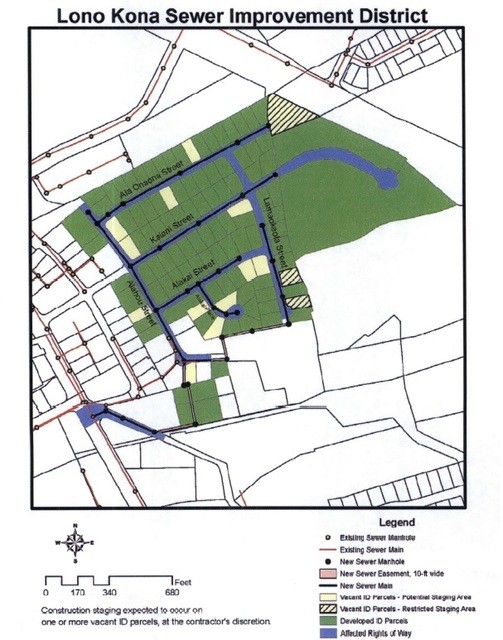HILO — When bids for the Lono Kona sewer project came in earlier this year, the county tossed them out, hoping for a better deal. The opposite happened when the new set of bids was opened Thursday — the bids came in even higher.
Four companies responded to the first bid request in January, with bids ranging from $7.7 million to $10.4 million. Two companies — Nan Inc. and Jas. W. Glover Ltd. — responded to the latest request, with bids of $8.5 million and $9.6 million, respectively. Isemoto Contracting Co. Ltd., the apparent low bidder the first go-round, didn’t submit a bid the second time.
The county had anticipated bids to be around $5 million to $6 million.
A $4 million U.S. Department of Agriculture Rural Utilities Service Grant was to fund the bulk of the program. The County Council previously approved authorizing a $2.4 million general obligation bond, which will be repaid by property owners hooking up to the system.
In the meantime, the County Council on Wednesday added $4 million to the budget by approving county money to make up the difference. Bill 124, passed unanimously on first reading, relies on general obligation bonds and money from the capital improvement fund for financing. The bill faces one more reading from the council.
“Hopefully, the bids came back lower,” said Kona Councilman Dru Kanuha on Wednesday. “We do not want to lose those grants.”
Environmental Management Director Bill Kucharski said Thursday the county had no choice but to reject the first bids because there wasn’t enough money in the budget to cover them.
“We didn’t have the funds encumbered to do it,” he said.
Kucharski said the county can’t seek other grants or low-interest loans, such as from the state revolving fund, because of the money coming from the federal government.
But Kona resident and former blogger Aaron Stene, who doesn’t live in the subdivision but closely follows government contracts, wasn’t happy about the situation.
“As it stands now, the project’s future is in a much precarious position than where it was in January,” Stene said in a letter Friday to Kucharski. “The residents of Lono Kona subdivision, and the taxpayers of the county, deserve better.”
The project will be built mauka of Highway in an area residents have dubbed “Hamburger Hill.” The subdivision dates back to 1962.
Several landowners within Lono Kona received violation notices from the U.S. Environmental Protection Agency for their continued use of large-capacity cesspools. The project area is a higher-density urbanized area where lot sizes generally do not have sufficient area for on-site disposal systems that require leach fields, according to county consultants.
The EPA banned large-capacity cesspools in 1999 and mandated their closure by 2005.
At a 2015 public hearing, residents had mixed reactions about the necessity and cost of the project. But few had outright opposition. The residents voted to tax themselves to pay for the project.
The design and bid process is expected to take at least a year. Officials in November had estimated completion by July 2019. It’s now set to be complete by December of that year.




